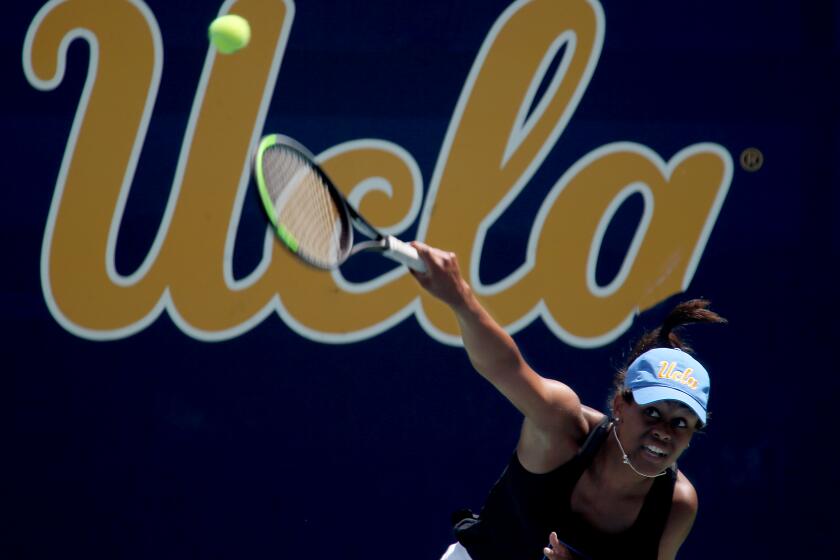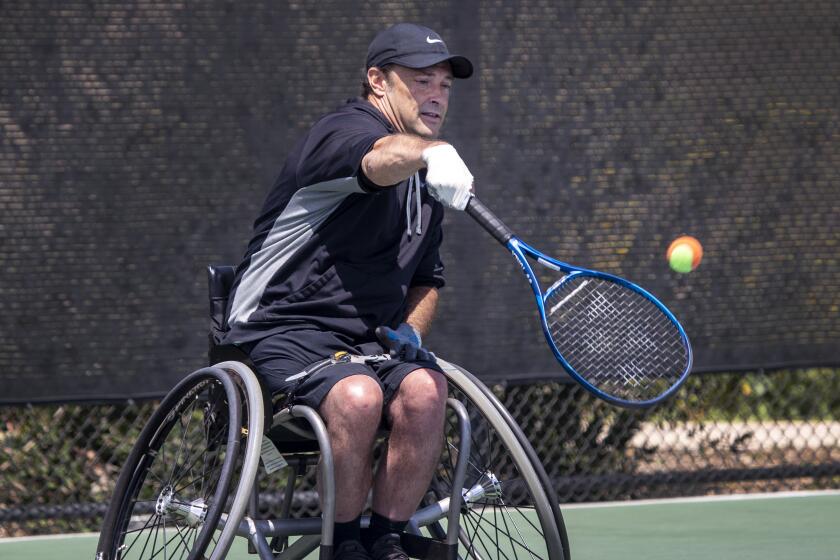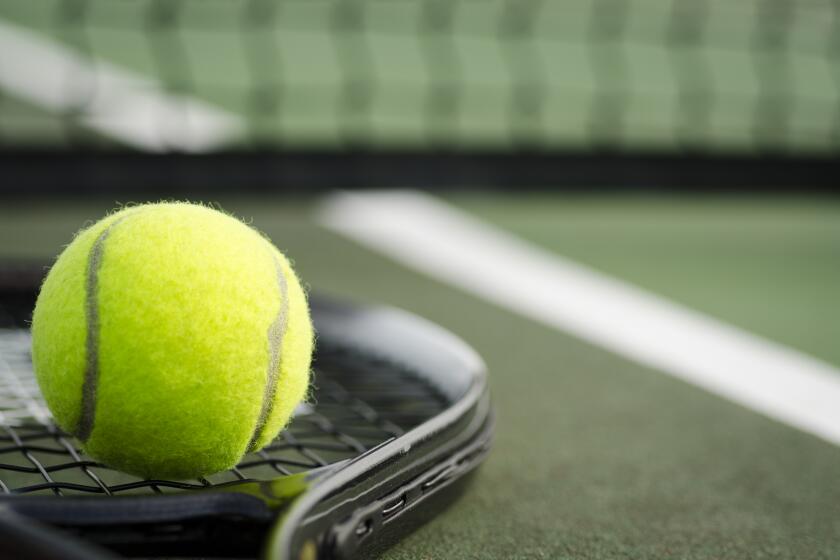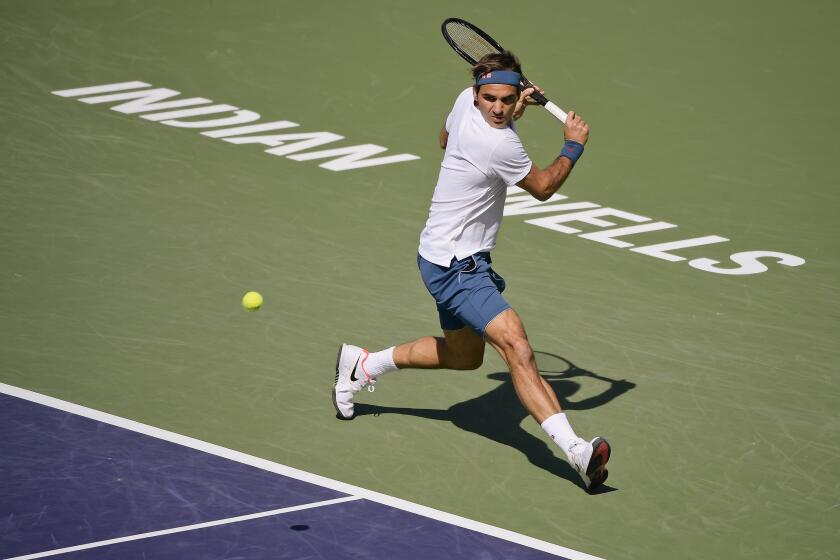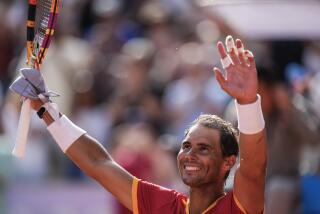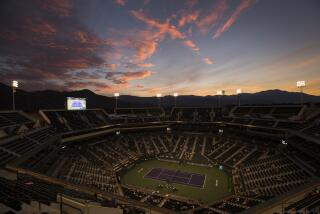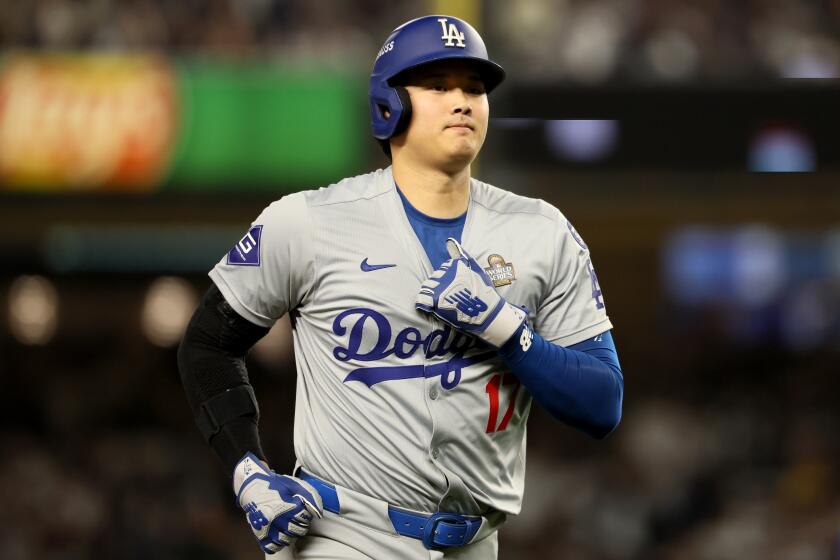Appreciation: Roger Federer’s return at French Open has greatest implications
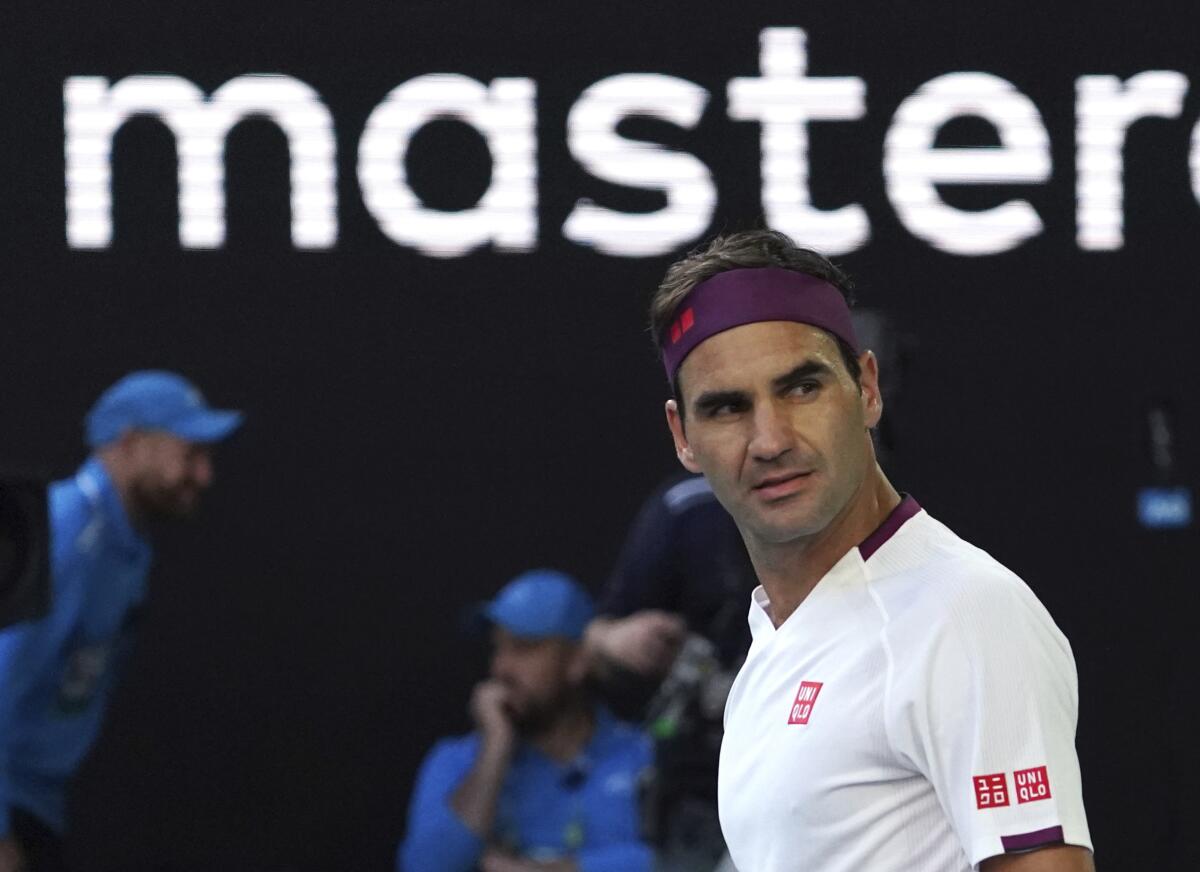
Little by little, our world is returning. Human nature tells us to laminate the sorrow, point eyes forward and tap the memory bank. Return to restaurants, invite neighbors to dinner, even get excited again about sports heroes.
Like Roger Federer.
No, he is not in a rest home somewhere. As a matter of fact, he will play in this year’s French Open, which starts Sunday. Yes, he will be 40 years old in August, but no, this is not a rocking chair tennis event. It is one of the sport’s four major tournaments.
Federer has been gone for a while. A tournament here and there, interspersed with bad knees and a bad back. His reduced activity is no surprise to anyone who checks out his Aug. 8, 1981, birthdate.
His sport is not one where you saunter to a batter’s box to swing a Louisville Slugger or walk to a tee box to swing a Big Bertha. Tennis players with extended careers have more miles on their chassis than your teenager’s ’89 Ford. Time treats tennis players like heavy rain treats your wooden patio deck. Tennis players erode. Federer has eroded. He is now the Swiss Maestro pondering hair dye.
Nevertheless, his comeback announcement deserves no disrespect, no scrunched-up noses nor rolled eyes.
Top UCLA tennis player Abbey Forbes is focused on the NCAA tournament, but her mind is never far from her brother Luke, who has leukemia.
It deserves appreciation for a once-in-a-lifetime athlete who not only won a lot, but also lost a lot with class. He has carried himself as the antithesis of so many sulking and entitled athletic millionaires, and he has continued to perform at a high level despite new wrinkles and aches and pains.
He is still ranked No. 8 in the world, and beyond numerical measurement, his value to the world of sports and the world in general is very high. Good thing he didn’t play baseball for the Angels. They would have “designated him for assignment”— (baseball leads the world in stupid, insensitive, meaningless transaction labels; Albert Pujols wasn’t designated for anything. He was dumped).
Federer is not going to win the French Open. If he does, move him to the top of the list of unbelievable moments in sports. He has won a single French title among his record-setting 20 majors, and that was in 2009, one of those stars-aligning years, when somebody named Robin Soderling took out the king of clay, the untouchable-on-red-dirt Rafael Nadal. That allowed Federer to dispatch Soderling in the final and complete a prestigious Career Grand Slam (at least one title in each of the four majors). It also likely prompted him to spend some time afterward, gazing heavenward in gratitude.
It’s not like Federer can’t play on clay. He has made it to four other finals at Roland Garros in Paris, but lost them all. To Nadal. Nadal tied Federer with his 20th major victory last year in Paris, and 13 of those majors are at the French Open. There, he has never lost a final in 17 years and has lost only two matches, that one in 2009 to Soderling and in 2015 to Novak Djokovic.
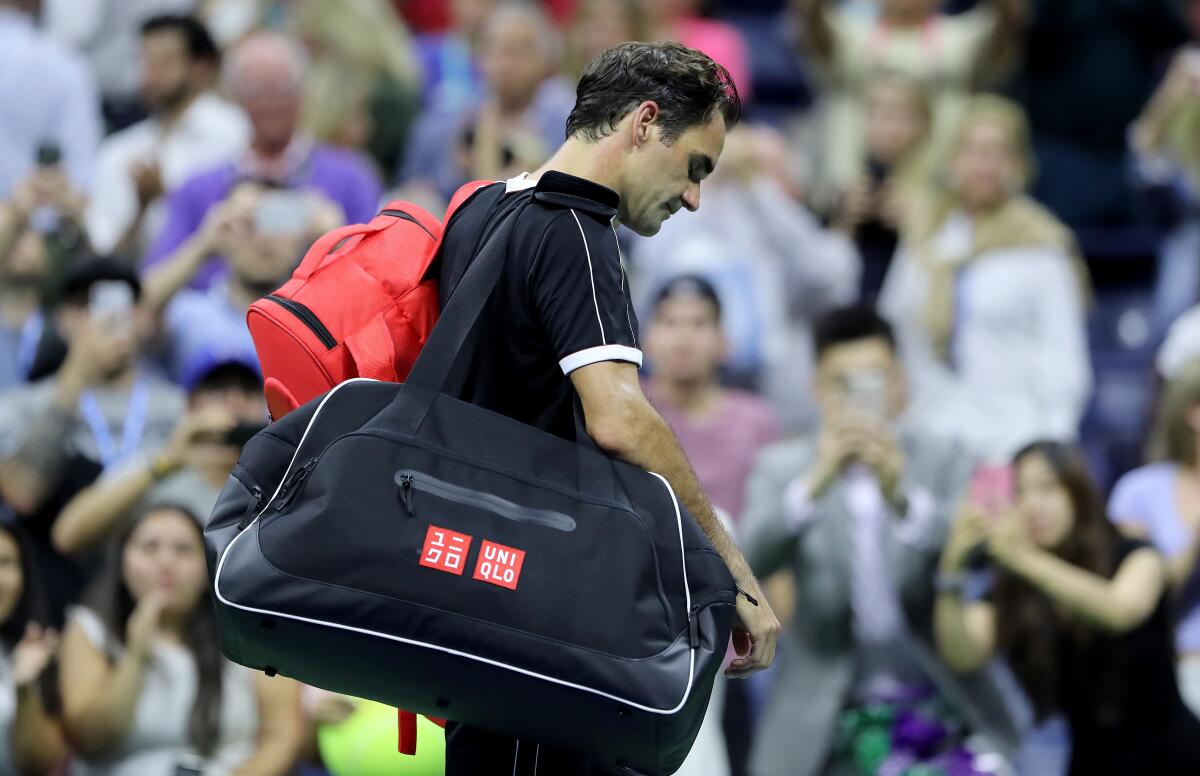
Federer had that in perspective long ago. In a 2012 interview with the Los Angeles Times, he said, “I don’t have a problem on clay. I have a Rafa problem on clay.”
The French Open notwithstanding, Federer’s place in sports imagery and legend are without dispute. If Wayne Gretzky hadn’t come along earlier and hockey hadn’t correctly seized on wonderful marketability, Federer might have been labeled the Great One. In tennis, he is.
He once said that he hoped, almost assumed, that he would go through his career without serious injury. That’s like Kyle Busch expressing surprise at a nick on his fender.
When Federer went to run some bath water for his twin daughters the day after he lost to Djokovic in the semifinals of the 2016 Australian Open, he felt a tweak in his left knee. He brushed it off, took the kids to the zoo and paid no attention until the swelling began. Soon, there was some minor surgery, which led to major surgery on the other knee, which led to his usual thrill of victory being replaced by the agony of getting the stitches out. Several times.
David Wagner became a quadriplegic while chasing a frisbee into a deceptive current at Redondo Beach. He discovered wheelchair tennis, and it became his calling.
He didn’t go away, of course. He rehabbed, worked hard, and ended a four-year, 15-grand slam drought by winning the Australian Open and Wimbledon in 2017 and the Aussie again in 2018. He also won in 2017 at Indian Wells, where he is beloved more than at any tour stop besides Wimbledon and any tournament in Switzerland.
His last sighting at Indian Wells was his 2019 loss in the final to Dominic Thiem. He had played beautifully throughout the tournament, but looked drained (aging) in the final. More injuries shut him down in 2020, even before the desert tournament had to shut itself down because of the pandemic. The world quarantined and so did Federer, although his was of different medical necessity — a bad knee that didn’t get better.
His announced goal was to get back for this year’s Australian Open. It didn’t happen. Now, he will be back in a major on the slow, tedious red clay of Paris.
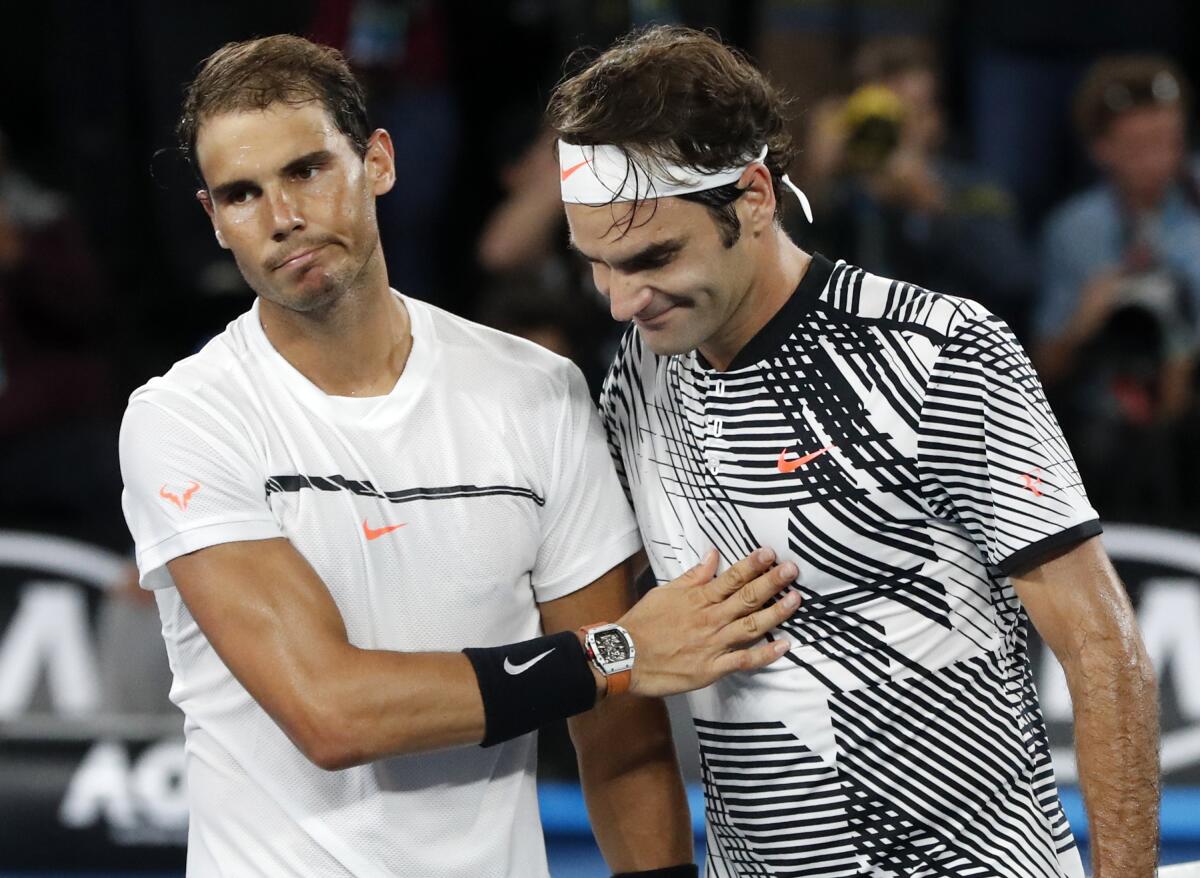
)
And when that happens, the image and likeness of Federer greatness will be much discussed. Again. Stories will mention the only missing page in his tennis resume, an Olympic gold medal in singles. Those same stories will then be inclined to mention how, nominated to carry the Swiss Olympic flag for the third time in an opening ceremony, he declined, saying: “Somebody else should get a chance.” And so, his doubles gold medal partner, Stan Wawrinka, did.
His humanitarian stature will be revisited by recounting the poll that once listed him No. 2 in the world among people most respected and trusted. No. 1 was Nelson Mandela.
The respect part always has been echoed by his top tennis opponents. Nadal and Djokovic, both of whom easily could claim the nickname for themselves, have repeatedly called Federer “the greatest player ever” — sometimes right after they have beaten him.
High school boys’ tennis: Southern Section playoff results and updated pairings
When Federer won a U.S. Open match against Sam Querrey, the big-serving Californian said some of the shots he saw from Federer that day were so extraordinary that, “You kind of want to jump over the net and high-five him.”
Federer’s on-court style has had the tennis typists searching long and hard for the poetry of the man. Bruce Jenkins of the San Francisco Chronicle once wrote that Federer’s shots were struck with “the casual aplomb of a gentleman pouring a glass of wine.” Others have pondered whether the phrase so often tied to Muhammad Ali — “float like a butterfly and sting like a bee” — would have been a better fit for Federer’s tennis game.
There is likely a method to Federer’s madness in launching this comeback at a tournament that is neither his favorite, nor his most prosperous. His return to the French was preceded last week by an appearance at the Geneva Open in his native Switzerland. He was expected to do well. It didn’t work out that way. He lost in the first round. Federer losing in the first round in anything in Switzerland is a real eye-opener.
The French is the real litmus test. It will give him the high-pressure court time he will need when he gets to Wimbledon three weeks later. He has won eight times at Wimbledon. Fans resting on history and sentimentality give him a chance. Reality says that another title there would necessitate flying in Al Michaels to intone, courtside, about believing in miracles.
Twilight is becoming dusk for Federer. Aussie Ken Rosewall got to the Wimbledon final in 1974 at age 39, but was dispatched by Jimmy Connors, 18 years his junior. For Federer to win it again, he will face an army of youth, not to mention Nadal and Djokovic.
Then, if the knees and the rest of the body hold together, there is the U.S. Open, the annual noisiest, craziest, highest pressure and most difficult event to win in the sport. That will begin 22 days after Federer turns 40.
Indian Wells announces the return of BNP Paribas Open after the tennis tournament was canceled and then delayed because of the coronavirus pandemic.
Still, wouldn’t one more major title be sweet? Or wouldn’t it be sweet if his body stays together long enough to return to Indian Wells? And this year!
It was announced this week that there will, indeed, be a 2021 BNP Paribas tournament sometime in October. No dates yet, but the prospect of watching Federer play in the desert again should have tennis fans salivating.
Eventually, it will have to end for Federer. That means, for tennis fans, parting will be Shakespearean. Such sweet sorrow.
For 22 years, we have watched him mostly succeed and sometimes fail, doing both with class. That not only will have to be enough. It is.
Editor’s note: Bill Dwyre is a former sports editor of the Los Angeles Times.
More to Read
Go beyond the scoreboard
Get the latest on L.A.'s teams in the daily Sports Report newsletter.
You may occasionally receive promotional content from the Los Angeles Times.
